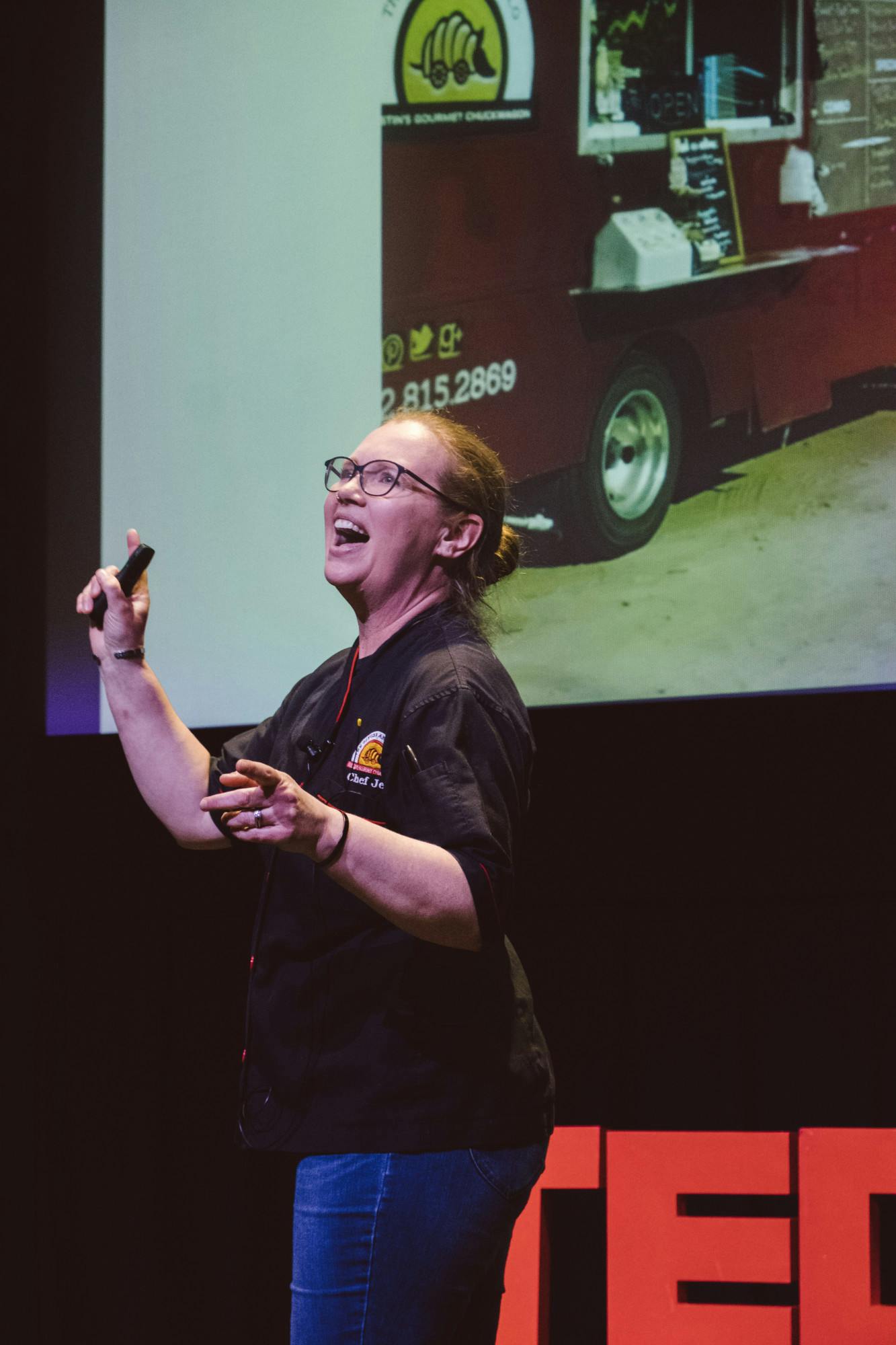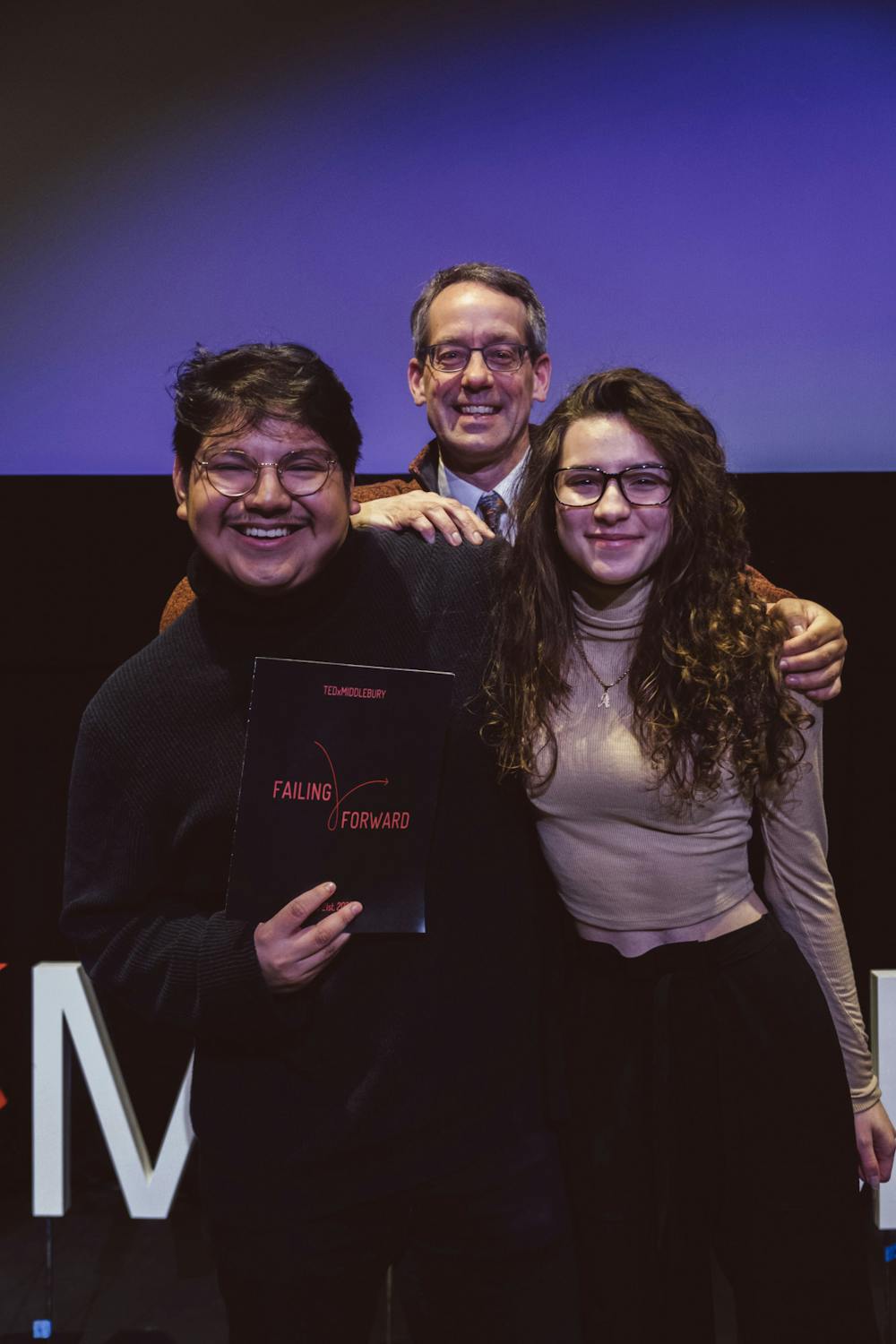“Maybe failure is worth dwelling on,” two TEDxMiddlebury organizers Kian Lalji ’23 and Liv Cohen ’23 told a full Dana Auditorium. On April 22, TEDxMiddlebury hosted Failing Forward, an event encouraging Middlebury speakers to share stories of failure, and how they grew from these trying moments. TEDx events are community-driven and mirror traditional TEDTalks — except that they showcase members of the local community.
Due to Covid-19-related restrictions last year, all speakers came from within the Middlebury College community. Though board members had the option to open the event up to outside speakers this year, they decided to make it a tradition and use the night to share stories from within Middlebury.
Before the talks began, emcees Cohen and Lalji presented a brief slideshow on the theme of the night. They began with a photo of the Leaning Tower of Pisa, a landmark that only gained popularity once it “failed” and began to lean. Next was a photo of Madonna, who was fired from Dunkin’ before she decided to try out music and gift us all with Middlebury-favorite “Like a Prayer.” The slideshow concluded with a photo of Lalji himself, a Dartmouth reject (aren’t we all?) who is grateful to have ended up at Middlebury instead.
The first speaker of the night was Professor of Psychology Matthew Kimble. He discussed the psychology of failing, how people prepare for failure and if they are ready for it. In his current research, he has found that an individual’s capacity to bounce back from adversity has far more to do with the community in which that individual lives — and the support that they have — than any specific characteristic of that person. “It’s not a question of whether or not those individuals can learn how to fail. It’s whether or not we, as a community, can learn how to love,” concluded Kimble.

Next up was Brian Conde-Martinez ’25, who discussed how people can use failure to become the best versions of themselves. He reflected on receiving a failing grade on a high school midterm, and his tendency to run from failure. He shared that failure actually generates cortisol in the brain, causing people to question themselves when plans fall apart.
“It all comes down to confidence. We have to take leaps of chance and be okay with failure… We have to realize that we don’t have all the power in every situation, and let ourselves take control instead of letting failure take control,” Conde-Martinez said.
Amanda Martins ’25 then took the stage to discuss the stigma around failure. She framed her talk around how she struggled with the idea of “failing forward,” as she reflected on how people continually repeat mistakes instead of moving forward. Her alternative notion was to think of failure as a spiral, in the sense that though people fail the same way again, they are still making progress.
“By failing outward, you can intersect your spiral with people who are doing the same thing, and you can grow and connect together in a beautiful way,” Martins said.
Jennifer Stratman, whom many may know from the Grille or the beloved Middlebury food truck, but who also once taught at famed culinary school Le Cordon Bleu in Austin, focused her talk on how her food truck business in Austin influenced who she is today. She took the audience through a series of trials that she went through as her business was getting off the ground. When she bought her first truck, it needed a completely new engine, and she had to jump through hoops to certify her truck to sell food and to find consistent openings where she could park it during the weeks.“I was surviving on sugar free Red Bull, and I was drunk on creative fulfillment,” Stratman said. Her talk concluded with the heartwarming story of how she moved with her husband to Middlebury, learning to take things in stride.

The final speaker of the night was Afra Fairooz ’25, a first year from Bangladesh whose personal experiences with female reproduction education encouraged her to start an NGO in her native country to fight the stigma surrounding menstruation. In many parts of the world, Bangladesh included, women are excluded from religious events while they are menstruating. Fairooz and three of her friends founded Put a Period, an organization with the goal of educating girls in Bangladesh about the menstrual cycle and how to take care of their bodies in an environment where many girls aren’t allowed to seek guidance from gynecologists. For their first project, they did a survey finding that a staggeringly high percentage of girls in Bangladesh didn’t even know why they had their period or what it even meant.
The talks given last Friday were inspiring, and it was special to hear such personal stories from people in the community. It is a rare opportunity to sit down for an evening and listen to people share their passions and vulnerabilities; and that is the intention of the TedX program: to create unique gatherings that inspire and inform.
Editor’s note: For more information on the speakers, visit sites.middlebury.edu/tedx/ or watch the talks here.




